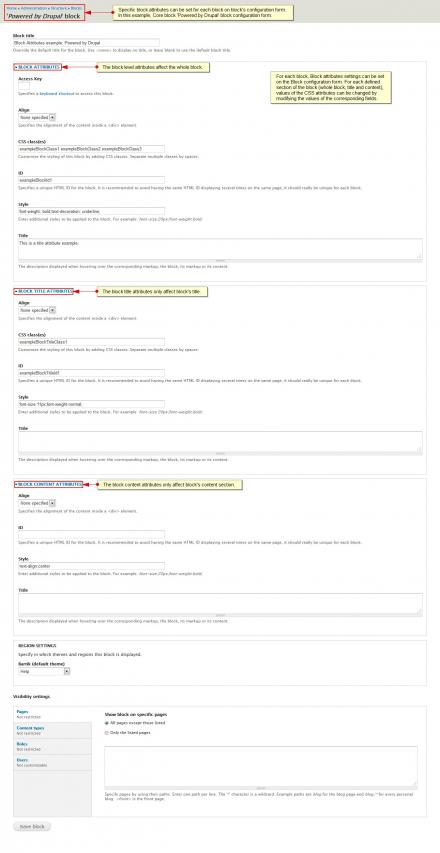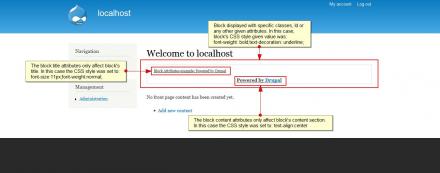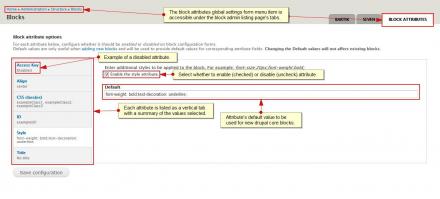 Support for Drupal 7 is ending on 5 January 2025—it’s time to migrate to Drupal 10! Learn about the many benefits of Drupal 10 and find migration tools in our resource center.
Support for Drupal 7 is ending on 5 January 2025—it’s time to migrate to Drupal 10! Learn about the many benefits of Drupal 10 and find migration tools in our resource center.The Block Attributes module allows users to specify additional HTML attributes for blocks, through the block's configuration interface, such as class, id, style, title and more.
Following up with a couple of related requests in the Block Class module:
It appeared the ability for users to configure Blocks' HTML ID, classes or custom styles has been a recurring request (for quite some time). Therefore, this module attempts to provide a solution for these cases and support more HTML attributes for blocks.
Since this module is entirely based on the template variables defined in block.tpl.php (Drupal 7) (or your theme block template's variables), make sure you take a closer look at the Implementation and Troubleshooting paragraphs below to learn more about known theme compatibility issues.
For developers and themers, it is entirely possible to extend currently supported attributes or template variables, see paragraph below For developers: Extending the module.
Table of Contents #
- Features
- Implementation
- Integration
- Installation and configuration
- Useful Resources
- Troubleshooting
- Developers/Extend
- Future developments
- Download!
Features #
First, a few concrete use cases for which this module will certainly come in handy:
- Give a block a specific HTML ID so it can be easily selected using jQuery or CSS (Watch out: an HTML ID is supposed to be unique on a page).
- Add additional classes or specific styles to a block or its title.
- Give a block or its title a particular text alignment.
- Add a specific keyboard shortcut for a block on a page.
Block Attributes can be configured globally through an admin settings form, allowing users to define which attributes should be enabled or disabled on each block's configuration form and their default values for new core blocks creation (see attached screenshot of the Block Attributes admin configuration form).
The module currently supports and allows users to set for each block the following attributes (per block settings):
✔ Accesskey
✔ Align
✔ Id
✔ Class
✔ Style
✔ Title
✗ Not yet suported: dir, lang, tabindex (see API document)
Through Block Attributes' API, developers have the flexibility to add any number of custom attributes, parameters or properties that could be implemented at the theme level (displaying custom template variables configurable through blocks' configuration forms, so possibilities are endless, see section For developers).
Implementation #
Basically, this module is a code mix between the Menu attributes and Block Class modules, based on the possibilities offered by Drupal block's theme structure and supported HTML attributes (see Future developments for Drupal 8 and new template or HTML standards).
As more theme variables appeared in Drupal 7's Block template (such as HTML ID, see Core issues #569362: Document $attributes, $title_attributes, and $content_attributes template variables, #306358: Add $classes to templates with new theme_process_hook functions, other themes issues #1422958: Properly use classes_array, attributes_array, title_attributes_array and content_attributes_array or GDO's Addition of an attributes array and probably many more discussions/issues), it appeared more and more theming parameters could potentially be configured through the interface for more advanced themers' needs.
Currently, the module operates on the following block theme variables (D7):
(Block scopes/sections in parenthesis)
- Block HTML ID:
$block_html_id(Block level attribute). - Block CSS classes:
$classes(Block level attribute). - Block's other HTML attributes:
$attributes(Block level attributes). - Block title attributes:
$title_attributes(Block title attributes). - Block content attributes:
$content_attributes(Block content attributes).
Most of the work had to be done around the database storage, greatly inspired from Block Class' 7.x-2.x branch, creating a new database field where all the parameters could be saved in a serialized array (since there are multiple attributes to be saved), very much the same way it is done by Menu Attributes in the database's menu_links.options field.
Other than changing the orientation of concept towards blocks, overall, module's API, permissions, admin form (with JS vertical tabs), HTML attributes, SimpleTests, Scopes/Groups, Panels integration, etc... had all to be slightly adapted to match closer with Block's theme variables, but in general, most of Menu attributes and Block Class features could cross-over very nicely with a great amount of similarities (Some parts could even be re-used almost exactly "as is", such as for the admin form or the vertical tabs' block_attributes.js).
Integration (with other modules) #
For any issues related with the Theme, please check the Troubleshooting paragraph below.
Otherwise, module should integrate properly with other modules for more advanced setups, such as Display Suite's block fields, Panels blocks, Context or Features with Features Extra's FE Block.
An example of a more advanced setup and integration usage could be displaying a custom block with custom HTML attributes, through a custom context all of that imported from code through a custom feature. Since block attributes are defined as a new field, FE Block makes it possible to export all of blocks' HTML attributes to code files, making the deployment process easier.
For debugging compatibility issues, it is highly recommended to test a problem first on a supported theme such as Bartik, to ensure it is not a theme related issue (see Troubleshooting below).
To report a compatibility issue, please create a new ticket in the bug tracker with the component Compatibility.
Installation and configuration #
All this information could also be found in module's README.TXT file.
0 - Prerequisites:
Requires the Core Block module to be enabled (see Core modules).
1 - Download the module and copy it into your contributed modules folder:
[for example, your_drupal_path/sites/all/modules] and enable it from the modules administration/management page (requires the block module to be enabled).
More information at: Installing contributed modules (Drupal 7).
2 - Configuration:
After successful installation, browse to the Block configuration page, for the specific block to be customized and directly start configuring block's HTML attributes (See attached screenshot).
For example, for the 'Powered by Drupal' block configuration page:
The path would be: admin/structure/block/manage/system/powered-by/configure
and breadcrumb: Home » Administration » Structure » Blocks
3 - Global Configuration (optional):
To define default values for newly created blocks' attributes or enable/disable certain ones, browse to the Block Attributes settings form page, either by using the "Configure" link (next to module's name on the modules listing page), or page's menu link displayed as a tab on the block admin listing page (See attached screenshot).
Path: /admin/structure/block/attributes
Home » Administration » Structure » Blocks
Useful Resources #
Whether developer, site builder or themer, you may be able to find more information on blocks' theme structure or attributes in the following links:
- W3C's index of the HTML 4 Attributes and HTML 5 Global Attributes.
- Drupal Core Block's documentation: Working with blocks (content in regions)
- Block Attributes API and README.TXT files.
- [Theming]Working with preprocess and process functions: Setting up variables for use in a template and HTML attributes and classes generated through theme variables.
- Drupal's Block template file: block.tpl.php (D7) and block.html.twig (D8)
- Drupal 7 API's block.module and block.tpl.php
- Drupal 8 API's block.module and block.html.twig
Any suggestions of additional resources that would be useful to the community would be warmly welcome and greatly appreciated.
Feel free to add your suggestions by creating a new ticket in the bug tracker with the component Documentation or re-opening the issue #2461335: Improve project page, README.txt and Help documentation with your comment.
Troubleshooting (known Theme issues) #
Probably one of the most common issues is related with blocks' configuration results not being reflected for a given theme, in other words:
The configuration for a block has been saved properly but the configured attributes are not displaying in the active theme.
To try narrowing down theme issues, a few simple things could be attempted first, such as flushing browser's and website's caches, checking in the HTML code for the presence of configured block's HTML attributes or ensuring block's theme file is not overridden.
Since the module currently operates on the Core block theme variables $block_html_id, $classes, $attributes, $title_attributes, $content_attributes (see Implementation above), if any of these variables were missing from your theme's block.tpl.php file, it is very likely some configurations of scopes or attributes might be dysfunctional.
Therefore, it is highly recommended to use a theme whose block template at least supports these theme variables.
For example, Zen theme's block.tpl.php doesn't output the $content_attributes variable, which is why none of the configurations under Block Content Attributes could be displayed without modifying template's code (similar issue for the Bootstrap theme and probably many more).
In any case, to report any theme related issue, please create a new ticket in the bug tracker with the component Theme.
If any problems arise from using advanced setups, such as blocks displayed through Panels, DS, Context, FE Block exports, etc... please refer to the section above named Integration. For troubleshooting/debugging module compatibility issues, please test the problem first on a supported theme such as Bartik (that's been tested and for which we are certain the module works, eliminating the possibility of being a theme issue).
Developers: Extending the module #
As mentioned above, it is possible to add any custom attribute, restricted or not to a section of a block (block, title, content) by leveraging module's API.
For example, by implementing a hook_block_attribute_info, a new drop-down select could be added in the Block Attributes fieldset for every block's configuration form, allowing users to select some custom values through the interface. The values could then be retrieved at any point (with a block_load), by accessing the options property: $block->options['attribute_example']. The value could then be output through a custom theme variable, added with a [THEME]_preprocess_block function in the active theme folder's template.php file (for more information see template_preprocess_block, block_attributes_preprocess_block and "[Theming]Working with preprocess and process functions" in the Useful Resources). Lastly, the theme variable would have to be printed in the HTML markup of the active template's block.tpl.php.
Comments, discussions, examples, cases, issues or patches related with implementations of module's API hooks would be highly welcome and greatly appreciated.
Future developments #
Module is subject to changes and restrictions from the W3C and HTML Standards (see W3C's links to HTML 4 and 5 attributes in the Useful Resources).
Among some of the features that could probably be supported but haven't been tested/developed yet, adding more properties, such as the dir, lang, title attributes or suffix/prefix (as needed) and further extending attributes in general. Additionally, allowing users to enable/disable certain scopes/groups, could also be an interesting feature since it appears numerous contributed themes made the choice to ignore certain theme variables (see Troubleshooting's Zen example).
Drupal 8's version would most likely require a major rework to support HTML5's attributes, markup and the new theme structure. The updating process from D7 to D8 (if there is ever any, other than manual, especially due to theme and HTML standards changes), might require some work as well, not to mention extensive testing.
Down the road, perhaps, this module could be merged into a global module (drupal_attributes or entity_attributes) that could hold all attributes related modules for node, menu, block, user, etc... especially with D8's new object/entity oriented approach .
Lastly, efforts could be made and hopefully sustained on the overall maintenance, with improved documentation, tutorials/presentations of how module's features could be leveraged or extended, module's translations, more simpletests (Automated Test Cases) and of course the usual bug fixes.
Contributions are welcome!!
Feel free to follow up in the issue queue for any contributions, bug reports, feature requests.
Tests, feedback or comments in general are highly appreciated.
Credits
We are particularly grateful to the Drupal community behind the Menu attributes and Block Class modules, their authors and all their contributors for their great work from which this module was greatly inspired and without which it would perhaps be far from having the number of supported features it has today.
Hopefully, new features, patches or tests added to this module might as well be ported/adapted to be contributed and shared back in return.
Sponsorship
This project is sponsored by Davyin. We provide specialist consulting services in Enterprise Drupal, Visit us at www.davyin.com.
Project information
Minimally maintained
Maintainers monitor issues, but fast responses are not guaranteed.Maintenance fixes only
Considered feature-complete by its maintainers.- Module categories: Content Editing Experience, Content Display
3,530 sites report using this module
- Created by DYdave on , updated
Stable releases for this project are covered by the security advisory policy.
Look for the shield icon below.
Releases
Development version: 2.x-dev updated 27 Jan 2024 at 14:18 UTC
Development version: 7.x-1.x-dev updated 26 May 2016 at 07:29 UTC
















